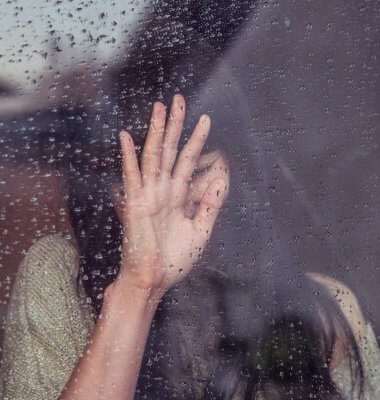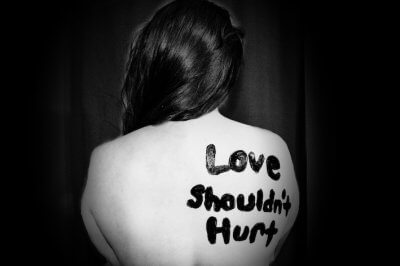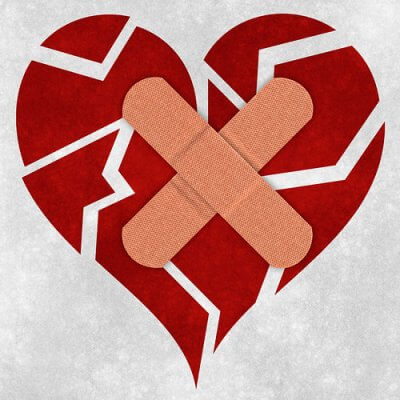Why Does Love Hurt? And How to Make it Stop

photo by milada vigerova
by Andrea M. Darcy
Just out of a relationship, or love someone who doesn’t love you back? And can’t keep wondering, why does love hurt?
Why does love hurt?
Feeling ‘in emotional pain’ isn’t just you being dramatic.
Researchers have discovered that your brain processes emotional upset with the same brain circuitry that processes physical injury. Social psychologist Naomi Eisenberger calls this ‘the physical-social pain overlap’.
It’s uncertain how our emotional pain ‘piggybacked’ onto the part of our brain that deals with physical pain. In a review of current research around this subject, Eisenberg suggests that it is because in our tribal days we needed to be part of a group to survive. So our brain evolved to give us warnings if things weren’t going so well socially.
Is heartbreak worse than breaking a leg?
In fact our ability to constantly relive pain from social experiences might mean that we end up with more pain from things like breakups or rejection than if we actually had a physical injury.
Research from Purdue University in America found that between an equally painful past physical injury and a past betrayal, participants in a study were far more able to still feel intense pain over the betrayal than the injury.
Love and physical illness
Anxiety and emotional distress not only leave us disorientated, they can and do cause physical symptoms.
Anxiety can cause things like muscle tension, an upset stomach, headaches, and a racing heart.
And a rare heart condition caused by acute emotional distress, stress cardiomyopathy, is also nicknamed by researchers ‘broken heart syndrome’. The heart muscle develops a weakness that mimics a classic heart attack, with a surge of adrenalin and other stress hormones

photo by: Sydney Sims
temporarily ‘stunning’ the heart.
Most people make a quick recovery without permanent side effects. But in rare cases, it can be fatal, giving all new meaning to the idea of ‘dying of a broken heart’.
Is it really love that hurts?
Yes, emotional pain is as much pain to our brains as a physical injury. But is that emotional pain you are experiencing really ‘love’?
From a psychology perspective, a loving relationship is a safe space to be accepted and encouraged, even as you accept and encourage in return. If that doesn’t ring a bell, then it might not be love at all, but lust, codependency, or love addiction.
- How long did you know the other person?
- Did you get to know each other slowly, in a trusting, safe way?
- Or was your relationship full of fire and drama?
- Did you manipulate and control each other?
- Did you keep secrets?
- Do you feel you don’t know who you are without them?
- Rush in?
- Was it volatile?
Love and romance addictions hurt because they come with highs and lows. While the highs feel euphoric, the crashing lows can leave us feeling physically exhausted and ill, particularly in comparison to the highs.
Is it present love that hurts, or is it your past?
Didn’t have a dramatic relationship? But feel huge, painful emotions your friends have said mean you are ‘overreacting‘? Or feel hurt by someone you hardly knew very long?
Unresolved past experiences or traumas can be triggered by present day interactions, meaning we are actually living out emotions from something in the past.
A classic example here is sexual abuse, which can leave a child with a core belief they are unworthy. As an adult, a tiny bit of rejection can leave them gutted and hating themselves. Or even overreacting and attacking the other person, if their childhood issues have evolved into a case of borderline personality disorder.
How to stop being hurt by love
Breakups and rejection can feel bad, and we need to process our emotions, not hide from them. But if you can’t move past them, it’s time to try new tactics.
1. Stop ‘telling the story’.
There are ways of telling the story of how your heart was broken that help heal it. This can look like journalling about it, or working it through in therapy.
But if you are constantly telling anyone who will listen about how so-and-so treated you wrong, broke your heart, etcetera, etcetera? You are actually keeping the pain going.
2. Use your ‘love pain’ as an opportunity.

By: Nicolas Raymond
Each time you find yourself thinking ‘love hurts’, notice how you are treating yourself in that exact moment.
We can use our obsession of being hurt by another as an excuse to abandon ourselves.
We give the responsibility for self care to this person from the past, and then we go and treat ourselves just like they treated us.
If you feel abandoned, how are you abandoning yourself? Are you taking care of your health? Are you around people who are nice to you, or choosing to spend time with those who put you down? Have you found time to notice your accomplishments for the day, or are you too busy criticising yourself?
3. Seek support.
- Is your love pain a pattern?
- Are you a wreck for months after each relationship ends?
- Always chasing the emotionally unavailable and feeling rejected?
Sometimes we are repeating a way of being and thinking we learned as a child that is so deeply entrenched it’s very, very hard to change alone. We need support.
A counsellor or psychotherapist can help you clearly identify these patterns, and learn and put into action new ways of seeing and behaving that actually attract the real love you long for.
Time to stop feeling hurt and start feeling loved? We connect you to some of London’s most highly regarded psychotherapists and counselling psychologists. Or use our booking platform to find UK wide affordable therapy and online counselling now.
Still have a question about why love hurts? Post below. All comments moderated.
 Andrea M. Darcy is a popular health journalist has penned thousands of psychology and self-help articles and is the editor and lead writer of this site. Find her on Instagram @am_darcy
Andrea M. Darcy is a popular health journalist has penned thousands of psychology and self-help articles and is the editor and lead writer of this site. Find her on Instagram @am_darcy





Wow, this has enlightened me so much. Thank you.
So I have two children two boys 11 and 6 me and their dad have been separated for a few years now and he goes out and gets girlfriends and lives with females and stuff and I want them to be nice and treat my kids well but then when they start saying I love you or embracing them with hugs and kisses and snuggling or just taking pictures with just my kids I get very upset do you know why or what causes me to feel that way or react that way because his girlfriend and him feel like I’m just stupid and they laugh at me and I just don’t know why I am the way I am
Jazakallah. I understand that love can be incredibly painful at times, and it’s important to take care of ourselves and seek support when needed. Emotions can be overwhelming, but with the right help and self-care, healing is possible.